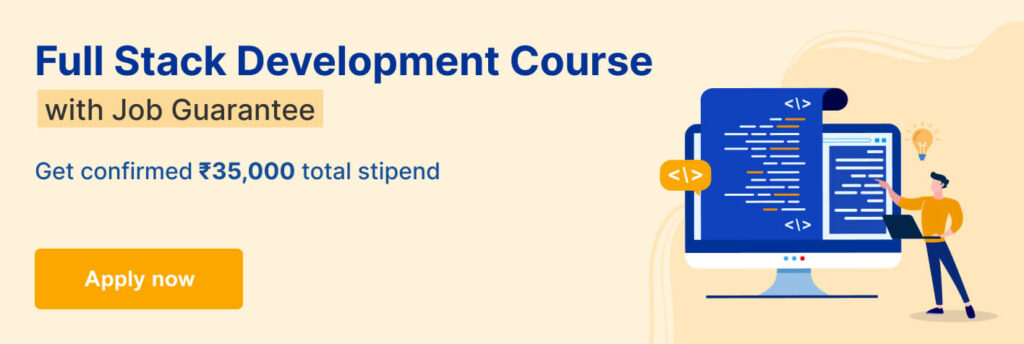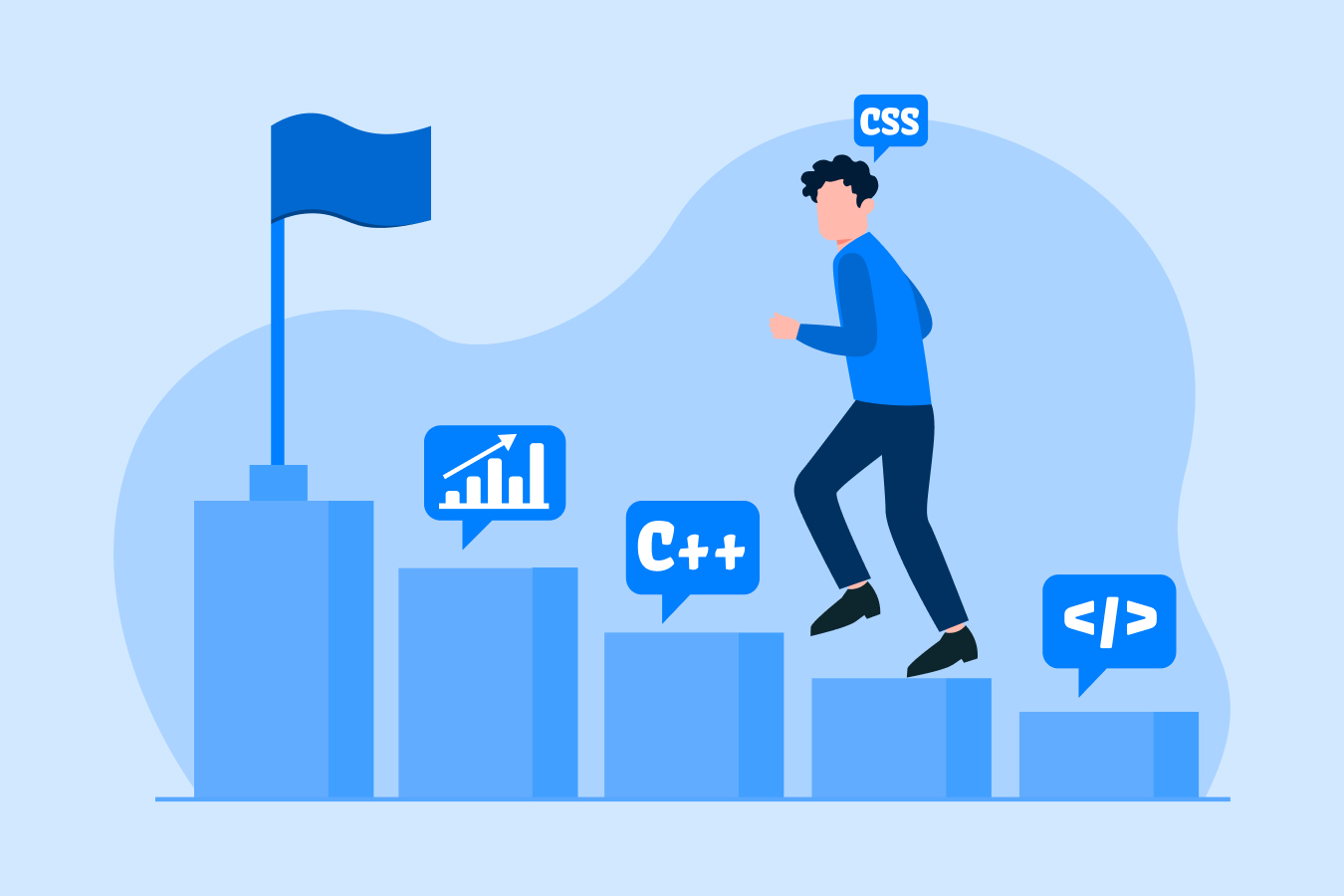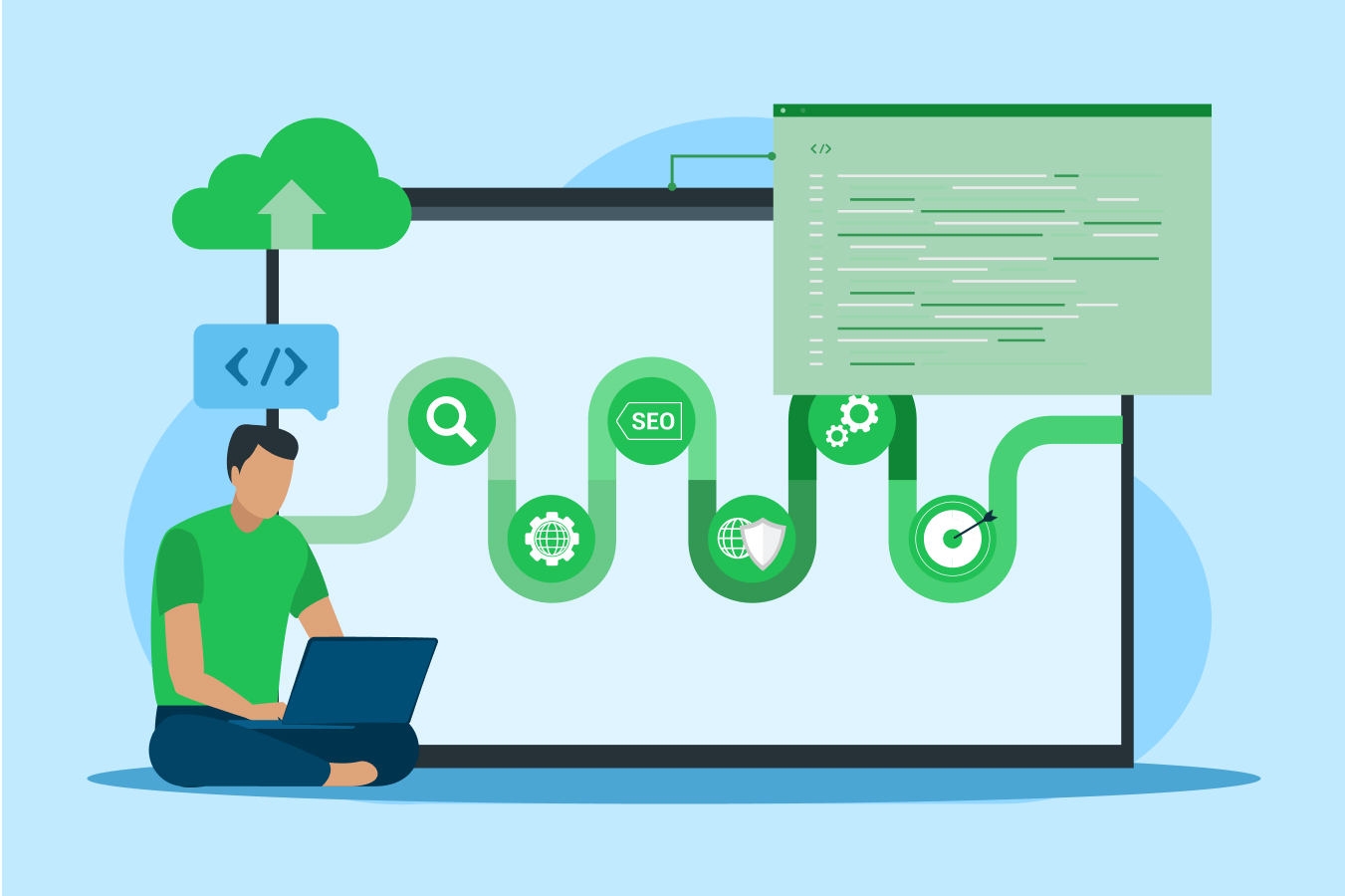How to Become a Web Developer?: A Step-By-Step Guide
Web development is one of the most in-demand fields in the world today. Organizations post numerous requirements for this role every day to enhance their websites and drive business growth. If you are someone who is passionate about this field, read on to learn how to become a web programmer with our comprehensive guide.
Who is a Web Developer?
A web developer is a professional who specializes in creating and maintaining websites. They are skilled in programming languages such as HTML, CSS, and JavaScript. Web developers use their expertise to design and build functional and visually appealing websites. They are responsible for ensuring that websites are user-friendly, responsive, and optimized for performance. There are three main types of web developers, depending on their area of expertise, namely:
i. Front-End Web Developer: They design and implement the visual elements and user interfaces of websites and web applications.
ii. Back-End Web Developer: They are responsible for developing server-side logic and database management systems to support web applications. They implement APIs and integrate third-party services to facilitate communication between the front-end and back-end components.
iii. Full-Stack Web Developer: Full-stack web developers work on both front-end and back-end development. They possess knowledge of various technologies, frameworks, and tools across the entire web development stack.
Roles and Responsibilities of a Web Developer
To become a successful web developer, it is crucial that you know the roles and responsibilities that come with the role. Here are some of the key duties and responsibilities of a web developer:
- Website Development: Create and maintain websites according to client requirements and project specifications.
- Front-End Development: Design and implement user interfaces using HTML, JavaScript, CSS, etc. to ensure optimal user experience and visual appeal.
- Back-End Development: Develop server-side logic, database management systems, and APIs to support the functionality of web applications.
- Cross-Platform Compatibility: Ensure that websites and web applications are compatible across different browsers, devices, and operating systems.
- Performance Optimization: Optimize website performance by minimizing load time, optimizing code, and implementing cache mechanisms.
- Security Implementation: Implement security measures, such as encryption, authentication, and authorization, to protect websites from security threats and vulnerabilities.
- Collaboration and Communication: Collaborate with designers, other developers, and stakeholders to understand project requirements, provide input, and ensure the timely delivery of high-quality solutions.
- Documentation: Document code, project specifications, and technical processes to facilitate understanding, troubleshooting, and future maintenance of projects.


How to Become a Web Developer: A Step-by-Step Process
After gaining a better understanding of who web developers are and what they do, let’s delve into the specifics of how you can become one yourself. Here is a step-by-step guide on how to become a web developer:
Step 1: Learn the Fundamentals of Web Development
Regardless of your educational background, acquiring a strong foundation in web development is crucial. Start by familiarizing yourself with HTML, CSS, and JS – the building blocks of web development. These languages determine the structure, style, and behavior of web pages, hence any aspiring web developer should be familiar with them.
Step 2: Choose Your Specialization
Web development encompasses various specializations, each requiring a distinct set of skills and expertise. You should explore different areas of web development, such as front-end, back-end, and full-stack development, to determine the one that aligns best with your interests and career goals.
Front-end developers focus on creating the visual elements and user interfaces of websites, while back-end developers handle server-side logic and database management. Full-stack developers possess skills in both front-end and back-end development, allowing them to work on all aspects of a project.
Getting certifications from companies like Microsoft, Internshala, Google, or Cisco, which are recognized in the industry, can also help you advance in your career and prove your knowledge.
Step 3: Enroll in Training Programs
Enrolling in a training program is crucial for individuals aspiring to excel in the competitive field of web development. Courses provide structured learning, hands-on experience, and mentorship, equipping students with essential skills and knowledge.
On the other hand, a full-stack web development course with placement will help you learn aspects like HTML, CSS, and more while also ensuring that you are able to find a placement after course completion.
Step 4: Create a Portfolio
Practical experience is just as important as theory in the world of web development. Start building your portfolio by working on various web development projects, such as designing a personal website, building a simple web application, or contributing to open-source projects on platforms like GitHub. These hands-on experiences will not only reinforce your learning but also showcase your skills to potential employers or clients.
Step 5: Build a Strong Professional Network
Networking plays a vital role in any career, including web development. Attend industry events, meetups, and conferences to connect with fellow developers, recruiters, and potential mentors. Join online coding communities and forums like Stack, Internshala Coding Club, Overflow, Reddit, or LinkedIn groups dedicated to web development to seek advice, share insights, and stay connected with the developer community. Building a strong professional network can open doors to job opportunities, collaboration projects, and valuable learning resources.
Step 6: Apply for Internships or Entry-Level Positions in Web Development
Applying for internships or entry-level positions in web development is a crucial step for aspiring professionals to gain practical experience and kickstart their careers. These opportunities provide hands-on exposure to real-world projects, allowing individuals to apply their theoretical knowledge and develop essential skills in coding, problem-solving, and collaboration. Internships and entry-level positions also offer valuable mentorship and networking opportunities, paving the way for future career growth and advancement in the ever-changing field of web development.
Here are some interview tips so you can prepare for your next interview and secure your desired role with ease:
- Tailor your resume and portfolio to highlight relevant skills, projects, and experiences.
- Prepare for technical interviews by practicing coding challenges, algorithms, and problem-solving exercises.
- Familiarize yourself with the company and its projects to demonstrate genuine interest.
- Hone your communication skills to effectively convey your ideas and technical knowledge during the interview.
Step 7: Stay Updated with the Latest Web Development Technologies
As you progress in your web development journey, don’t hesitate to delve into more advanced topics and technologies. Stay updated with the latest trends and advancements in the industry, such as responsive web design, progressive web apps, and emerging programming languages or frameworks like React, Angular, or Node.js. Continuously expanding your knowledge and skill set will make you a more competitive and versatile web developer.
Web Developer Skills
A web developer requires multiple skills to become a proficient web developer. Some of the most commonly required skills are:
Technical Skills
- Proficiency in programming languages such as HTML and CSS, and back-end languages like Python, Ruby, PHP, or Java.
- Familiarity with front-end frameworks such as React, Angular, or Vue.js, and back-end frameworks like Node.js, Django, or Laravel.
- Understanding of database management systems like MySQL, MongoDB, or PostgreSQL, and experience with database querying and manipulation languages such as SQL.
- Knowledge of version control systems like Git and proficiency in using code collaboration platforms like GitHub or Bitbucket.
- Experience in responsive web design principles and frameworks like Bootstrap, Foundation, or Materialize CSS.
- Ability to debug and troubleshoot code efficiently, utilizing browser developer tools and debugging techniques.
- Understanding of web security principles and best practices, including cross-site scripting (XSS) prevention, data encryption, and secure authentication methods.
Soft Skills
- Strong problem-solving abilities and logical thinking to address complex technical challenges and optimize web applications for performance and usability.
- Effective communication skills to collaborate with cross-functional teams, interpret client requirements, and articulate technical concepts to non-technical stakeholders.
- Adaptability and willingness to learn new technologies and frameworks to stay updated with industry trends and advancements.
- Attention to detail to ensure code quality, maintainability, and adherence to coding standards and best practices.
- Time management and organizational skills to prioritize tasks, meet project deadlines, and manage multiple projects simultaneously.
- Creativity and a keen eye for design aesthetics to create visually appealing and user-friendly web interfaces.
- Teamwork and collaboration skills to work effectively in agile development environments and contribute to a positive team culture.
Future of Web Development
The future of web development is always bright because a web developer is a necessity in our technology-driven world:
- Integration of Advanced Technologies:
- Machine Learning (ML) and Artificial Intelligence (AI) are becoming integral parts of web development, enabling personalized user experiences, predictive analytics, and smarter content delivery.
- Augmented Reality (AR) is revolutionizing web interfaces by merging digital content with the physical world, creating immersive experiences for users directly through their browsers.
- Progressive Web Applications (PWAs) and IoT:
- PWAs are redefining the web landscape by providing app-like experiences with offline capabilities, push notifications, and smooth performance across devices.
- Internet of Things (IoT) is intertwining with web development, allowing websites to interact with connected devices, sensors, and data streams, creating dynamic and responsive interfaces.
- Impact of Digitization:
- Digitization is fueling the demand for web developers as businesses increasingly rely on digital platforms for their operations, marketing, and customer engagement.
- Web developers are tasked with creating responsive, scalable, and secure solutions to meet the evolving needs of digital consumers and businesses.
- Salary and Job Outlook:
- Web development remains a well-paying career, with salaries varying based on experience, expertise, and location.
- As businesses continue to invest in their online presence, the demand for skilled web developers is expected to grow, offering lucrative opportunities for professionals in the field.
- Increasing Opportunities:
- The proliferation of e-commerce, social media, and online services opens up diverse avenues for web developers, from front-end design to back-end development and beyond.
- Specialized areas such as cybersecurity, data analytics, and cloud integration present additional opportunities for web developers to expand their skill sets and advance their careers.
Check out our blog on web developer salary to know how much does a web developer earn in their career.
Conclusion
Becoming a web developer can be an exciting and fulfilling journey, with endless opportunities for growth and creativity. This blog can, no doubt, provide you with the knowledge and skills needed to know how to become a web developer in this fast-paced industry, but it’s important to commit to lifelong learning and development. Keep in mind that dedication, perseverance, and a passion for technology are the keys to success in web development, regardless of your level of programming experience.







